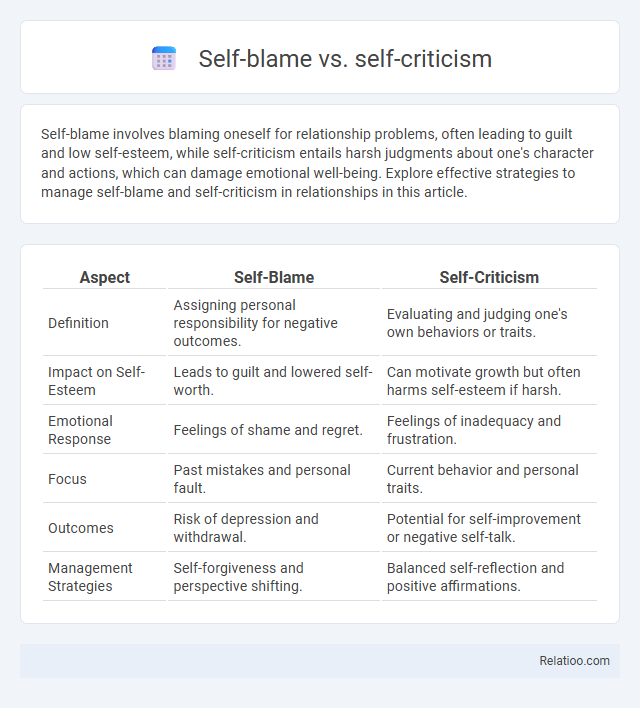Self-blame involves blaming oneself for relationship problems, often leading to guilt and low self-esteem, while self-criticism entails harsh judgments about one's character and actions, which can damage emotional well-being. Explore effective strategies to manage self-blame and self-criticism in relationships in this article.
Table of Comparison
| Aspect | Self-Blame | Self-Criticism |
|---|---|---|
| Definition | Assigning personal responsibility for negative outcomes. | Evaluating and judging one's own behaviors or traits. |
| Impact on Self-Esteem | Leads to guilt and lowered self-worth. | Can motivate growth but often harms self-esteem if harsh. |
| Emotional Response | Feelings of shame and regret. | Feelings of inadequacy and frustration. |
| Focus | Past mistakes and personal fault. | Current behavior and personal traits. |
| Outcomes | Risk of depression and withdrawal. | Potential for self-improvement or negative self-talk. |
| Management Strategies | Self-forgiveness and perspective shifting. | Balanced self-reflection and positive affirmations. |
Understanding Self-Blame: Definition and Origins
Self-blame involves attributing personal responsibility to yourself for negative events or outcomes, often rooted in past experiences or upbringing that emphasize accountability. Unlike self-criticism, which focuses on assessing your behaviors and mistakes to promote improvement, self-blame centers on internalizing fault and can lead to feelings of guilt or shame. Understanding the origin of your self-blame patterns helps to break the cycle and fosters healthier self-compassion and emotional resilience.
What Is Self-Criticism? Key Features Explained
Self-criticism involves evaluating oneself harshly, often emphasizing perceived flaws and mistakes, which can lead to decreased self-esteem and increased emotional distress. Unlike self-blame, which specifically assigns responsibility for negative outcomes, self-criticism broadly assesses personal worth and competence, frequently resulting in persistent negative self-talk. Key features of self-criticism include perfectionism, excessive guilt, and a tendency to ruminate on shortcomings, differentiating it from the more situational and outcome-focused nature of self-blame.
Core Differences Between Self-Blame and Self-Criticism
Self-blame involves attributing fault or responsibility for negative outcomes primarily to oneself, often linked to feelings of guilt and regret. Self-criticism, however, entails an evaluative judgment of one's character or actions, frequently leading to lowered self-esteem and harsh internal dialogue. The core difference lies in self-blame targeting specific events or mistakes, while self-criticism reflects a broader, more pervasive negative self-assessment.
Psychological Impact: How Both Behaviors Affect Mental Health
Self-blame and self-criticism, though often interchanged, differentially affect mental health by contributing to anxiety, depression, and lowered self-esteem. Self-blame typically involves attributing negative outcomes to one's character or identity, intensifying feelings of guilt and hopelessness, while self-criticism focuses on evaluating behaviors or actions, which may motivate change but also increase stress and perfectionism. Chronic engagement in either behavior exacerbates psychological distress, amplifying the risk of developing mood disorders and impairing emotional resilience.
Root Causes: Why We Engage in Self-Blame and Self-Criticism
Self-blame and self-criticism often originate from deep-rooted issues such as low self-esteem, unresolved trauma, and internalized negative beliefs formed during childhood or adverse experiences. These patterns serve as maladaptive coping mechanisms, where individuals attempt to gain control or make sense of failure and pain by attributing fault to themselves. Understanding the psychological roots--like perfectionism, fear of rejection, and distorted self-perception--helps differentiate between self-blame's emotional burden and self-criticism's evaluative nature.
Common Triggers of Self-Blame vs. Self-Criticism
Common triggers of self-blame include personal failures, perceived mistakes, and situations where individuals feel directly responsible for negative outcomes, often leading to feelings of guilt. Self-criticism typically arises from unmet personal standards, fear of judgment, or comparison to others, fostering harsh internal dialogue and diminished self-esteem. While self-blame centers on attributing fault to oneself for specific events, self-criticism involves broader negative evaluations of one's character or abilities.
The Role of Childhood and Upbringing
Childhood and upbringing play a crucial role in shaping self-blame, self-criticism, and guilt, influencing how you internalize experiences and respond emotionally. Children exposed to overly harsh or neglectful parenting often develop heightened self-criticism, while inconsistent or punitive environments may foster chronic self-blame and feelings of guilt. Understanding these early influences can help in addressing maladaptive thought patterns and improving emotional resilience.
Healthy Alternatives: Cultivating Self-Compassion
Self-blame often leads to feelings of guilt and helplessness, while self-criticism involves harsh judgment that undermines self-esteem; both can contribute to stress and mental health issues. Cultivating self-compassion offers a healthy alternative by promoting kindness, understanding, and acceptance toward oneself, which has been linked to greater emotional resilience and well-being. Evidence from psychological research emphasizes practices like mindfulness and positive self-talk to replace destructive patterns with nurturing self-support.
Practical Strategies to Overcome Self-Blame and Self-Criticism
Practical strategies to overcome self-blame and self-criticism involve cultivating self-compassion, challenging negative thought patterns, and practicing mindfulness to increase emotional awareness. You can reframe self-critical thoughts by identifying cognitive distortions and replacing them with balanced, realistic perspectives. Engaging in positive affirmations and seeking support from therapists or support groups enhances resilience and fosters healthier self-perception.
When to Seek Professional Help
Persistent self-blame can lead to feelings of worthlessness, while chronic self-criticism often fuels anxiety and depression, signaling the need for professional intervention when these patterns interfere with daily functioning or personal relationships. Seeking therapy becomes crucial if self-blame or self-criticism results in overwhelming guilt, impaired self-esteem, or suicidal thoughts. Mental health professionals provide cognitive-behavioral strategies and emotional support to break these destructive cycles and promote healthier self-perception.

Infographic: Self-blame vs Self-criticism
 relatioo.com
relatioo.com